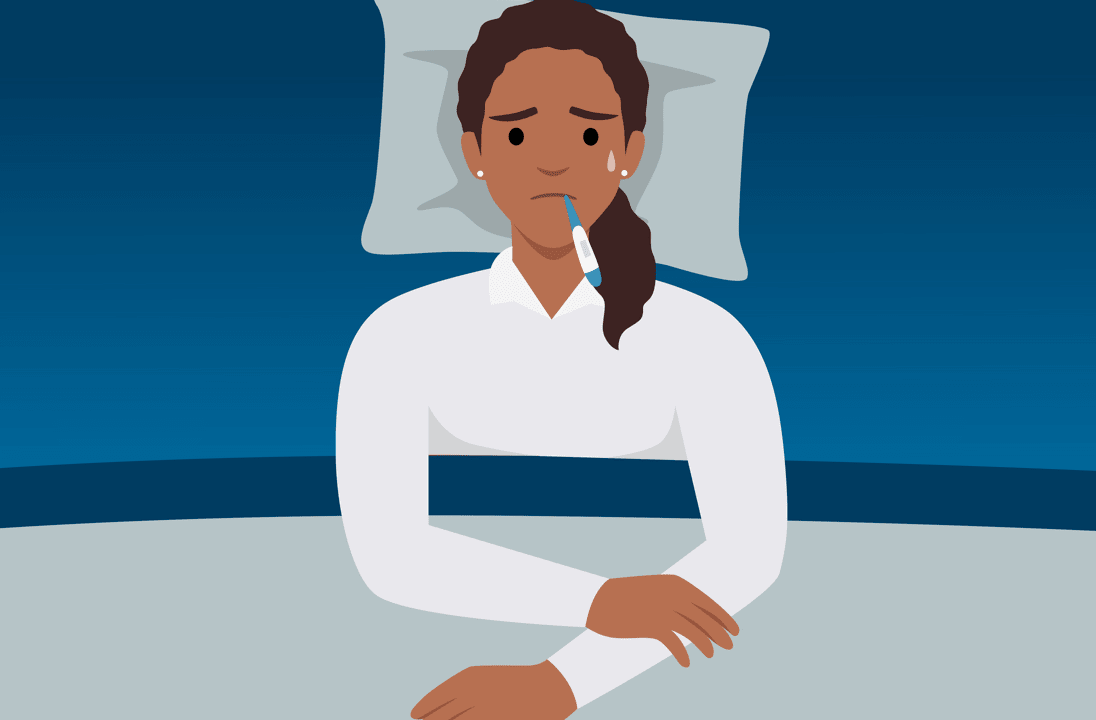Should I see a doctor: Fever

So, you fell asleep with a runny nose but woke up covered in a sweat with a fever, coughing and sneezing.
Do you wait it out, take some over-the-counter medications or rush to urgent care? The answer may depend on your age, immune system strength or whether there’s a clear reason your temperature is spiking.
What’s ‘normal’
A fever is part of your body’s natural immune system response to fighting off a viral or bacterial infection.
A fever is considered a reading of 100.4 degrees Fahrenheit or higher. Fluctuations below that could be attributed to things like age, physical activity, other health conditions or hormones.
Is it a fever or is it menopause?
Fevers will typically come with other symptoms and last at least a few hours. A hot flash will be easy to spot because it’s intense and short-lived.
For older children and adults, the average fever lasts anywhere from 12 hours to a few days. The length and severity of a fever depends on several factors, including whether you’ve been immunized against the particular virus, or whether you’ve contracted a version of it before. A fever will almost always be accompanied by other symptoms, such as coughing, sneezing or gastrointestinal problems.
Don’t be alarmed, though, if a short-lived fever catches you by surprise. If it goes away within a day, it’s possible your immune system fought off a virus before you even noticed.
What’s ‘not normal’
Infants 3 months and younger should be seen by their doctor or other health care provider immediately for any level of fever.
Children 3 to 36 months with a fever of 102.2 or higher and no other symptoms should be evaluated — they could be at risk for a urinary tract infection (UTI) or ear infection. If they’re experiencing cough or congestion, you’re safe to wait and see if the fever reduces.
In adults, a fever that lasts longer than five days, worsens quickly or has no identifiable cause is reason to see a primary care provider. Additionally, if you’re experiencing repeated short-lived fevers every few days or weeks without other symptoms, talk with your provider. Sneaky conditions to look out for in adults that could cause a sudden fever could be a UTI, kidney infection or meningitis.
Caring for your condition
Begin by correctly monitoring your temperature. For infants and young children, a rectal thermometer will provide the most accurate number, while oral thermometers will work for older children and adults. Avoid forehead thermometers when possible, which can be influenced by outside factors.
Ensure that oral thermometers are as far back as possible under the tongue and that you have not recently consumed a hot or cold beverage.
When fighting a fever, get lots of water and rest and treat your symptoms as needed.
If your fever is causing discomfort, such as body aches, consider an over-the-counter fever reducer such as acetaminophen or ibuprofen. Many people believe that alternating between the two can be beneficial, but there’s no proof that it’s more effective than sticking to one — and you run the risk of incorrectly dosing the medication, especially in children.
You may want to try things like a lukewarm bath or ice packs to cool your body down momentarily, but it’s also important to let your body work out the virus. It may feel like you’re “sweating it out,” but your body is just doing what it’s built to.
Medical review provided for this piece by Cassandra Prewitt, FNP, with MultiCare Rockwood Clinic Urgent Care.
What's next
- Schedule an appointment online with your primary care provider
- Find an urgent care location near you for concerns that can’t wait
- Should I see a doctor: Chronic fatigue




